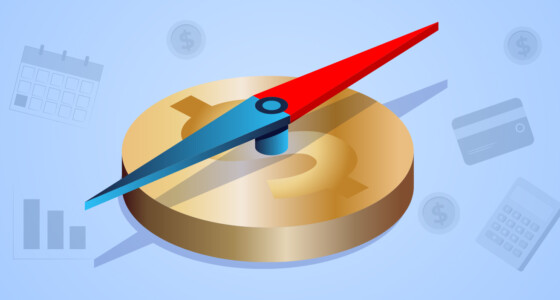

Even small expenses, while added, may turn into a considerable loss in the end. For example, buying a pizza every week during the year you spend an amount of money equal to $1000 which you could otherwise invest to get an additional income. There are at least 10 mistakes that we make without understanding how much money we lose.
1. Ignoring budgeting
If you do not count your money you will never know what you spend it on. In fact, keeping a budget is quite simple. Take a sheet of paper and divide it in two columns. The left one stands for expenses and the right one for income. Now you have started your first balance sheet. Fill it in for a month and you will see clearly all your incomings and flows. If your balance sheet is equal, it is a good starting point. But your real goal is to make the right column prevail.
2. Not making a financial plan
If you live without a financial plan, you do not know your goals. You survive from paycheck to paycheck without a hope to change this situation. May any emergency happen and you will be short of money, so you will have to borrow or apply for a banking credit which may appear costly.
3. Not paying yourself first
The phrase ‘pay yourself first’ comes from the icon book ‘The Richest Man in Babylon’ by George Samuel Clason. The meaning of this advice is: when you get your salary or any other income you should reserve at least 10% for yourself. Only after you do it, you can pay the others for things that you buy from them, for example, food or goods. These 10% reserved regularly form your personal fund that you can use as a financial cushion or invest to get additional income.
Note! Pay yourself first to preserve your money.

4. Spending on things you do not really need
Unnecessary spending makes a great hole in your pocket. A shopaholic walks out of a department store with hands full of bags with any kinds of things that money can buy. At the end of the month this person will deeply regret not being more thrifty. Financially stable people never waste their money on things that they do not need. They only pay for the necessary goods.
5. Borrowing money or getting loans
Borrowing provokes you to live over your budget and spend more than you can afford. If you obtain money from banks, you have to pay interest rates, that is extra expense. Starting borrowing once you step on a risky path of constant stress. Besides, in that case you can not put funds aside to invest them and get extra income, because you have to repay your loans in the first place.
6. Buying new things instead of those which still can be used
It is a common mistake that poor people make. For example, buying a new model of smartphone or a new car if the old one still works properly. Financially independent people who know how to preserve their capital buy goods of high quality not only because they are prestigious but also because they are long lasting. Purchase goods of the highest quality that you can afford and use them as long as you can without attempting to buy a new model only because your friend or neighbor did so.
7. Not trying to get additional income
Money should work, that is the main principle by which financially stable people live. If you do not get additional income you lose money. Learn how to invest your funds and earn more even with small sums that you can contribute. You need to make the first step to start walking towards financial stability.
8. Not saving money
A penny saved is a penny earned, wise people say. Meanwhile, keeping your funds in a kitchen jar is not a good idea, because they can easily be stolen or spent on unimportant matters. It is better to open a savings account in a reliable bank and keep your resources there collecting an interest on a regular basis. To make your savings more protected you could diversify your investments, for example, buy treasury bonds or stocks of prosperous commercial enterprises.
9. Living with expectation of a lucky chance
There is a good saying ‘a fool and his money are soon parted’. It means that somebody acts so carelessly that he loses his money. Most often this phrase describes a person who spends a lot of cash on lottery tickets or other matters that promise immediate reward as a result of a lucky chance. Remember: easy come, easy go. Even if you win once you will most likely lose what you have gained.
10. Living beyond your means
If you are always short of money you may be living beyond your means. In other words you spend much that you earn. How is that possible? – you would ask. The answer is quite obvious: banking cards, friendly loans, financial aid from your relatives may support you for the time being. It is fine if you cope with your financial situation for now, but in the perspective living beyond your means is a dangerous habit that leads to money losses.









